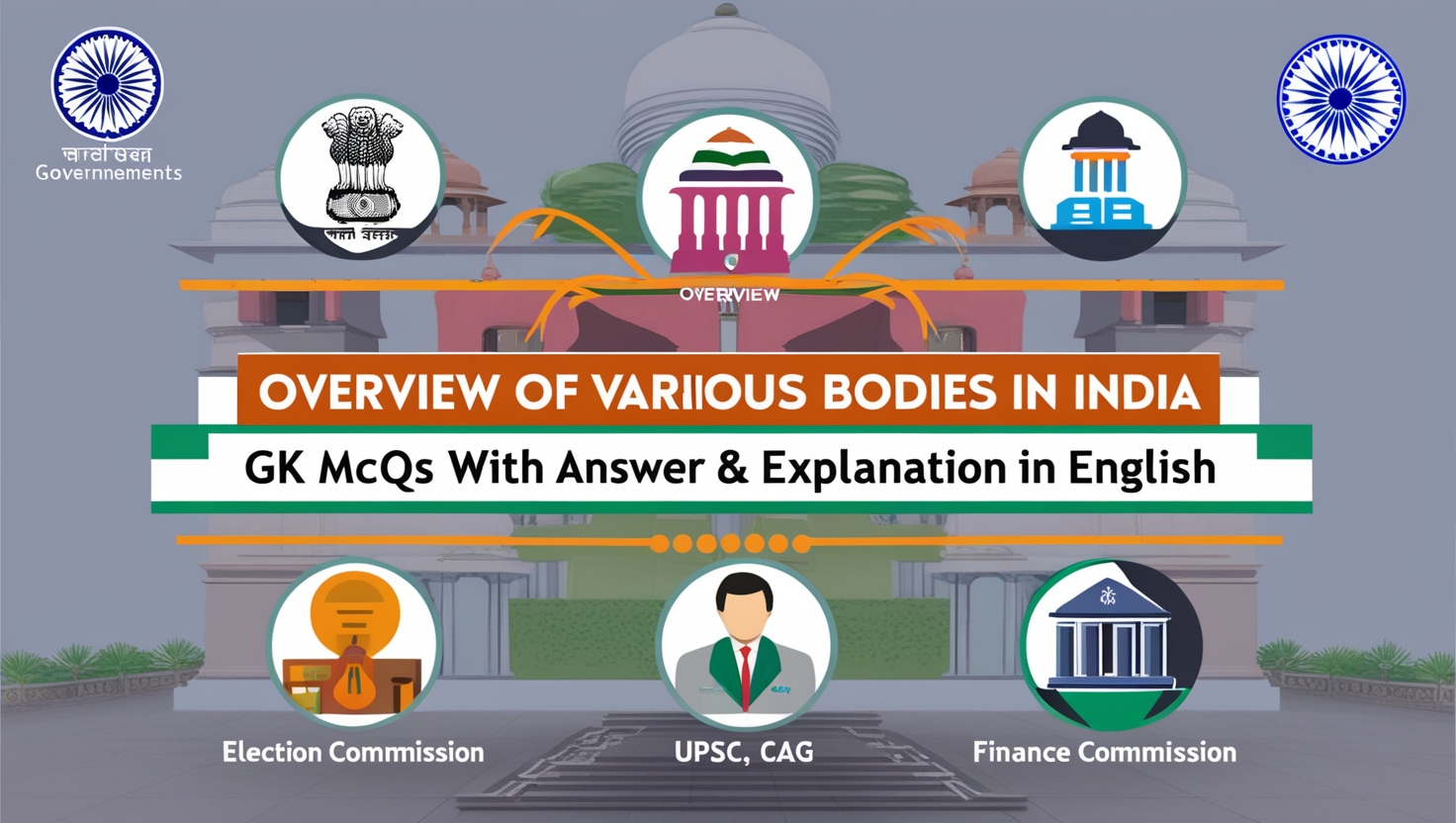
In this article, titled Overview of Various Bodies in India GK MCQs With Answer & Explanation in English, we provide a comprehensive guide to understanding the key governmental and constitutional bodies in India.
Through multiple-choice questions (MCQs) with detailed answers and explanations, this article aims to enhance your knowledge of these important institutions and their functions in the Indian political system. Whether you’re preparing for competitive exams or simply looking to broaden your understanding, this resource will be invaluable.
1. In which year was the National Human Rights Commission established?
- 1992
- 1993
- 1994
- 1995
Show Answer
Answer: 1993
The National Human Rights Commission in India is a statutory body. It was established in the year 1993 under a legislation enacted by the Parliament (Protection of Human Rights Act, 1993).
2. The National Commission for Women was established in which year?
- 1991
- 1992
- 1993
- 1994
Show Answer
Answer: 1992
The National Commission for Women is a statutory body. It was established by the government of India in January 1992 under the National Commission for Women Act, 1990.
3. When was the National Commission for Minorities established?
- 1992
- 1993
- 1994
- 1995
Show Answer
Answer: 1992
The National Commission for Minorities was set up under the National Commission for Minorities Act, 1992. Initially, five religious communities, viz., Muslims, Christians, Sikhs, Buddhists, and Zoroastrians were notified as minority communities by the Union Government.
4. Which constitutional amendment provided constitutional status to the National Commission for Backward Classes?
- 100
- 101
- 102
- 103
Show Answer
Answer: 102
The 102nd Constitution Amendment Act, 2018 provided constitutional status to the National Commission for Backward Classes (NCBC). It examines the complaints and welfare measures regarding socially and educationally backward classes.
5. The National Law Commission is which type of body?
- Statutory body
- Constitutional body
- Executive body
- None of the above
Show Answer
Answer: Executive body
Law Commission of India is neither a constitutional body nor a statutory body. It is an executive body which was established by an order of the Government of India. Its major function includes working for legal reforms.
6. In which year was the National Green Tribunal established?
- 2000
- 2005
- 2007
- 2010
Show Answer
Answer: 2010
NGT is a specialised body set up under the National Green Tribunal Act of the year 2010. It was set up for effective and expeditious disposal of cases relating to environmental protection and conservation of forests and other natural resources.
7. In which year was the National Consumer Disputes Redressal Commission (NCDRC) established?
- 1966
- 1975
- 1988
- 1990
Show Answer
Answer: 1988
The National Consumer Disputes Redressal Commission (NCDRC) established by the Government of India is a quasi-judicial commission. It was set up in 1988 under the Consumer Protection Act of 1986. Its head office is in New Delhi.
8. In which year was the Armed Forces Tribunal Act passed?
- 2001
- 2003
- 2005
- 2007
Show Answer
Answer: 2007
The Armed Forces Tribunal Act was passed in the year 2007 by the Parliament. It led to the formation of AFT with power of adjudication or trial by Armed Forces Tribunal of disputes and complaints with respect to commission, appointments, enrollments and conditions of service in respect of persons subject to the Army Act, 1950, The Navy Act, 1957, and the Air Force Act, 1950.
9. The Advertising Standards Council of India (ASCI) was established in which year?
- 1985
- 1990
- 1995
- 2000
Show Answer
Answer: 1985
The Advertising Standards Council of India (ASCI) was established in 1985. It is committed to the cause of Self-Regulation in Advertising & ensuring the protection of the interests of consumers.
10. Which type of body is the Competition Commission of India (CCI)?
- Statutory body
- Constitutional body
- Executive body
- Private Institution
Show Answer
Answer: Statutory body
The Competition Commission of India (CCI) is a statutory body established by the Government of India. The Commission is responsible for enforcing the Competition Act, 2002 throughout the India union.








Leave a Reply